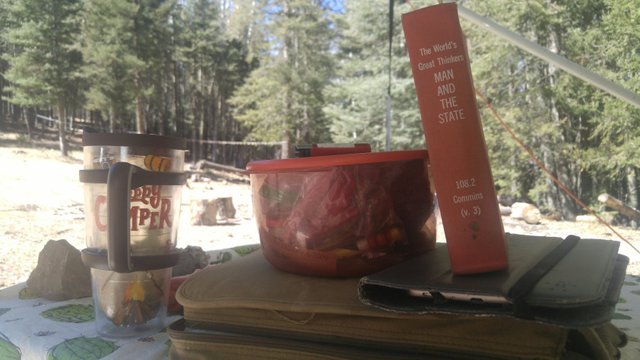
It occurred to me while reading Hobbes that a Commonwealth could never form under Theonomic law. That is, natural man will never assent to be governed under God’s law. Natural man will always be at enmity with God and therefore always at enmity with the State claiming God as Sovereign. Natural man in a Theonomic Commonwealth would be in constant fear of legal execution, as he can always be considered treasonous towards the government of the territory he inhabits.
The Theonomic Commonwealth would be a nation of coercion and force. It would be a nation in constant civil war. The only men who can covenant with God are those who are in Christ. All other men are unable to make such a covenant and therefore would be enemies of God and the Theonomic Commonwealth. Such a State would result in innumerable false conversions and revolt against the Gospel itself.
Hobbes describes three types of Commonwealth: the Monarchy, the Democracy, and the Aristocracy. None of these are suitable for Theonomy.
In a monarchy one man is given all the authority of the people by those who covenant together to grant him authority. In Theonomy, God grants power to governments. Government is not created by man to keep peace, it is instead created by God to bear the sword and enact justice.
I have had Theonomists argue with me that government can take any form as long as it obeys the civil laws of the Old Testament. But in the case of a representative monarchy, who is the sovereign and who is the subject? In a Commonwealth, the sovereign is the representation of the people who covenanted together to be ruled by him. They are “the author of his actions”. Surely man is not the author of God’s actions. How would a king be chosen? If the king represented God and His law, would he not be unlike the Pope?
“God’s law would be the law of the land, much like the Constitution.” Again, natural man is opposed to God’s law. We would not of our own volition subject ourselves to it, nor would we elect representatives who would subject themselves to it. Democracies and aristocracies therefore wouldn’t fit the mold either, unless we suppose the entire nation to be saved.
From what I have read about both subjects, I don’t see how a Theonomy could operate as anything other than a theocratic dictatorship, with either a Pope-like “King” enforcing God’s law as he interprets it, or a counsel doing the same. Either way it ends up a violent police state and completely negates the reason man comes together to form governments in the first place.
I may agree on some of your assumptions, yet I think they are to rigid to describe practice in a useful way. Natural man is not opposed to God's law, but merely has the choice to be opposed to it and a tendency to disobey, not to mention that humans tend not to be consistent over time- that is where the true need for discipline stems from. Hence a king may be elected by people seeking discipline and justice. Stanislaus de Scarbimiria wrote: 'a commonwealth is ruled well only if it's laws obey God's will as a state belongs to God only when it is guided by truth- that truth being love of one's neighbour and it's rules- justice an equality.' God's will for the human is freedom as well as obedience as without freedom to rebel obedience is, as you wrote, tyranny.
Downvoting a post can decrease pending rewards and make it less visible. Common reasons:
Submit
You got a 44.71% upvote from @peace-bot courtesy of @driptorchpress!
Help spread the peace. Want to promote your posts too? Send a minimum of .02 SBD or STEEM to @peace-bot with link in the memo for an upvote on your post. You can also delegate to the bot for daily passive earnings. If you would like to delegate to the Peace Bot you can do so by clicking on the following links:
50SP 100SP 250SP 500SP 1000SP 5000SP
Learn more!
Downvoting a post can decrease pending rewards and make it less visible. Common reasons:
Submit
You just received a 95.24% upvote from @honestbot, courtesy of @driptorchpress!

Downvoting a post can decrease pending rewards and make it less visible. Common reasons:
Submit